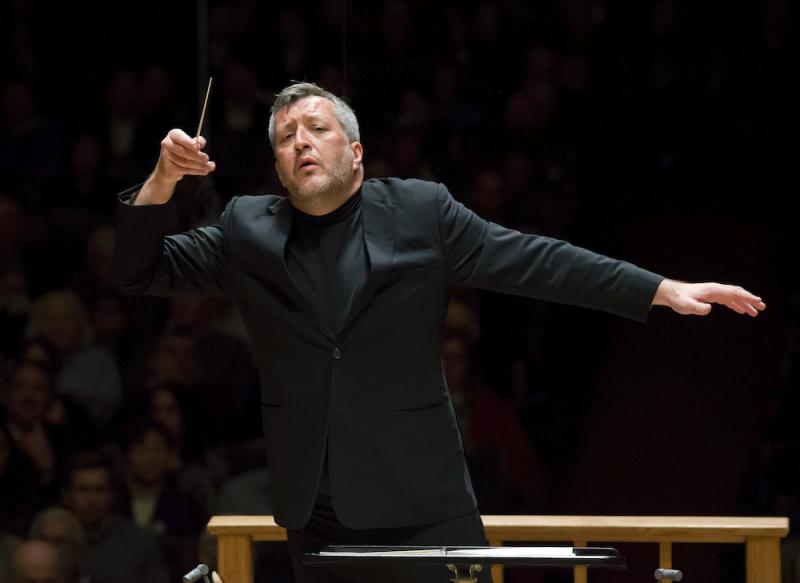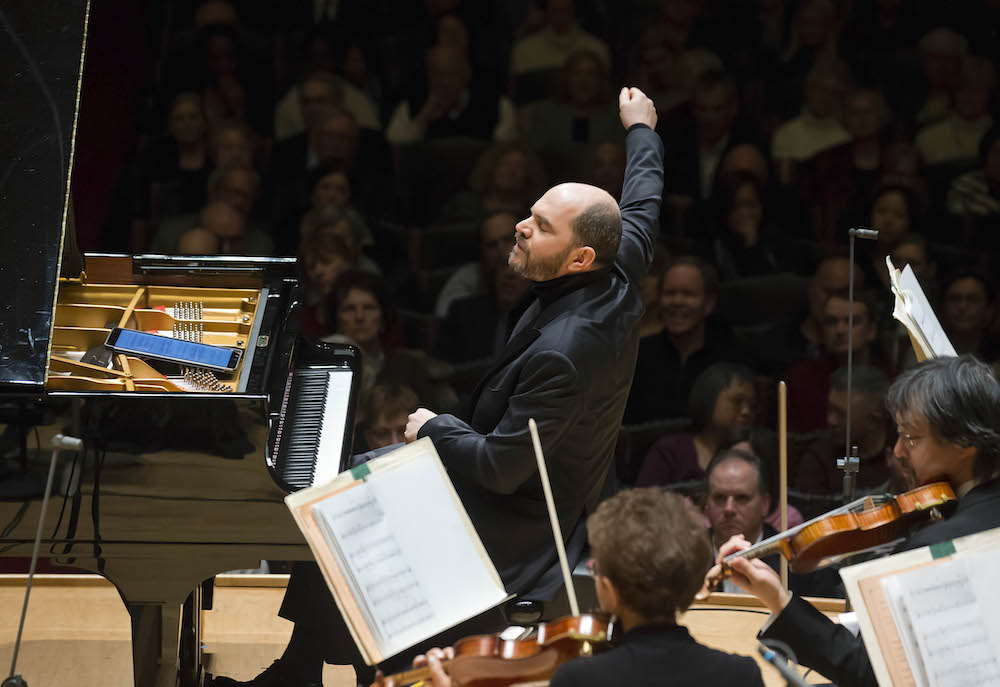Gerstein, LPO, Adès, RFH review - engaging new piano concerto | reviews, news & interviews
Gerstein, LPO, Adès, RFH review - engaging new piano concerto
Gerstein, LPO, Adès, RFH review - engaging new piano concerto
The composer conducts the UK premiere of his impressive latest work

Every ten years or so Thomas Adès writes a piano concerto and the latest had its UK premiere last night at the Royal Festival Hall, played by Kirill Gerstein and conducted by Adès himself.
The concerto has lots of Adès trademarks: rhythmic complexity in the form of polyrhythms and irregular meters, technical virtuosity required of the whole ensemble, not just the soloist and a quicksilver variety of changing textures. Here he also adds a richness of scoring, a melodic charm and solid foundation of a very traditional structure.
The big beasts that hide in the background, occasionally peeping above the parapet include Rachmaninov, in rippling piano textures, Prokofiev, in the bold final bars of the first movement, and an intriguing mixture of Gershwin and Ligeti in the beguiling slow movement. The piece, commissioned by the Boston Symphony Orchestra uses large forces (unlike the earlier chamber scorings) and it is possible to detect an American brashness, both in the instrumental writing, which is perhaps more primary-coloured than usual, and in the material, which is unapologetically big-boned. Gerstein (pictured above by Winslow Townson) gave a terrific performance, not just in the meaty business of the outer movements, but in the alternately tender and stern second. He captured the kaleidoscopic sounds and textures, projecting over the orchestra but also happy to be part of the orchestra. He deserved his warm reception in the hall.
Gerstein (pictured above by Winslow Townson) gave a terrific performance, not just in the meaty business of the outer movements, but in the alternately tender and stern second. He captured the kaleidoscopic sounds and textures, projecting over the orchestra but also happy to be part of the orchestra. He deserved his warm reception in the hall.
For a composer, Adès is a good conductor, but good rather than great: better than, say, John Adams but no Esa-Pekka Salonen. His beat is clear – important in the blizzard of meter and tempo changes in his piece – but he has a tendency to micromanage. It’s pretty certain he wouldn’t be conducting the LPO if his music wasn’t on the programme, but with that acknowledged he did a perfectly good job, not just in the concerto but in Holst’s The Planets, that were the second half.
This piece is so familiar that we can forget how extraordinary it is – what else is like it? – and Adès and the LPO threw themselves into it with the necessary determination and vim. The first movement – “Mars, The Bringer of War” – is, for all that follows, surely the best bit. The LPO were sufficiently violent and destructive, with some fine timpani playing and spot-on ensemble in the big chords at the end.
There was lots to like in the playing throughout. “Venus, The Bringer of Peace” saw a change of tone exemplified by John Ryan’s fragile horn solo. Adès took the central section of “Jupiter” – aka “I vow to thee, my country” – at a refreshingly fast pace, banishing any sentimentality or solemnity. The brass here were gleaming and fabulous, and in “Uranus”, where the whole orchestra captured beautiful the jolting change from frenzied dance to frozen stasis. The grim tread of the basses in “Saturn” had a wonderful inevitability about it before the celesta, harp and upper voices brought “Neptune” to its icy end.
rating
Explore topics
Share this article
The future of Arts Journalism
You can stop theartsdesk.com closing!
We urgently need financing to survive. Our fundraising drive has thus far raised £49,000 but we need to reach £100,000 or we will be forced to close. Please contribute here: https://gofund.me/c3f6033d
And if you can forward this information to anyone who might assist, we’d be grateful.

Subscribe to theartsdesk.com
Thank you for continuing to read our work on theartsdesk.com. For unlimited access to every article in its entirety, including our archive of more than 15,000 pieces, we're asking for £5 per month or £40 per year. We feel it's a very good deal, and hope you do too.
To take a subscription now simply click here.
And if you're looking for that extra gift for a friend or family member, why not treat them to a theartsdesk.com gift subscription?
more Classical music
 First Person: Manchester Camerata's Head of Artistic Planning Clara Marshall Cawley on questioning the status quo
Five days of free events with all sorts of audiences around Manchester starts tomorrow
First Person: Manchester Camerata's Head of Artistic Planning Clara Marshall Cawley on questioning the status quo
Five days of free events with all sorts of audiences around Manchester starts tomorrow
 Goldscheider, Brother Tree Sound, Kings Place review - music of hope from a young composer
Unusual combination of horn, strings and electronics makes for some intriguing listening
Goldscheider, Brother Tree Sound, Kings Place review - music of hope from a young composer
Unusual combination of horn, strings and electronics makes for some intriguing listening
 theartsdesk Q&A: composer Donghoon Shin on his new concerto for pianist Seong-Jin Cho
Classical music makes its debut at London's K-Music Festival
theartsdesk Q&A: composer Donghoon Shin on his new concerto for pianist Seong-Jin Cho
Classical music makes its debut at London's K-Music Festival
 Helleur-Simcock, Hallé, Wong, Bridgewater Hall, Manchester review - moving lyricism in Elgar’s concerto
Season opener brings lyrical beauty, crisp confidence and a proper Romantic wallow
Helleur-Simcock, Hallé, Wong, Bridgewater Hall, Manchester review - moving lyricism in Elgar’s concerto
Season opener brings lyrical beauty, crisp confidence and a proper Romantic wallow
 Kohout, Spence, Braun, Manchester Camerata, Huth, RNCM, Manchester review - joy, insight, imagination and unanimity
Celebration of the past with stars of the future at the Royal Northern College
Kohout, Spence, Braun, Manchester Camerata, Huth, RNCM, Manchester review - joy, insight, imagination and unanimity
Celebration of the past with stars of the future at the Royal Northern College
 Jansen, LSO, Pappano, Barbican review - profound and bracing emotional workouts
Great soloist, conductor and orchestra take Britten and Shostakovich to the edge
Jansen, LSO, Pappano, Barbican review - profound and bracing emotional workouts
Great soloist, conductor and orchestra take Britten and Shostakovich to the edge
 Jakub Hrůša and Friends in Concert, Royal Opera review - fleshcreep in two uneven halves
Bartók kept short, and a sprawling Dvořák choral ballad done as well as it could be
Jakub Hrůša and Friends in Concert, Royal Opera review - fleshcreep in two uneven halves
Bartók kept short, and a sprawling Dvořák choral ballad done as well as it could be
 Hadelich, BBC Philharmonic, Storgårds, Bridgewater Hall, Manchester review - youth, fate and pain
Prokofiev in the hands of a fine violinist has surely never sounded better
Hadelich, BBC Philharmonic, Storgårds, Bridgewater Hall, Manchester review - youth, fate and pain
Prokofiev in the hands of a fine violinist has surely never sounded better
 Monteverdi Choir, ORR, Heras-Casado, St Martin-in-the-Fields review - flames of joy and sorrow
First-rate soloists, choir and orchestra unite in a blazing Mozart Requiem
Monteverdi Choir, ORR, Heras-Casado, St Martin-in-the-Fields review - flames of joy and sorrow
First-rate soloists, choir and orchestra unite in a blazing Mozart Requiem
 Cho, LSO, Pappano, Barbican review - finely-focused stormy weather
Chameleonic Seong-Jin Cho is a match for the fine-tuning of the LSO’s Chief Conductor
Cho, LSO, Pappano, Barbican review - finely-focused stormy weather
Chameleonic Seong-Jin Cho is a match for the fine-tuning of the LSO’s Chief Conductor
 Classical CDs: Shrouds, silhouettes and superstition
Cello concertos, choral collections and a stunning tribute to a contemporary giant
Classical CDs: Shrouds, silhouettes and superstition
Cello concertos, choral collections and a stunning tribute to a contemporary giant
 Appl, Levickis, Wigmore Hall review - fun to the fore in cabaret and show songs
A relaxed evening of light-hearted fare, with the accordion offering unusual colours
Appl, Levickis, Wigmore Hall review - fun to the fore in cabaret and show songs
A relaxed evening of light-hearted fare, with the accordion offering unusual colours

Add comment